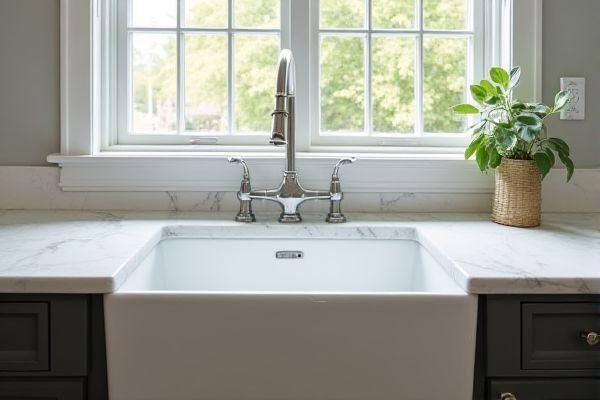
Farmhouse sinks offer a deep basin and stylish front apron, ideal for kitchen tasks and enhancing decor, while utility sinks prioritize durability and functionality for heavy-duty cleaning in laundry rooms or workshops. Explore the article to determine which sink best suits your space and needs.
Table of Comparison
| Feature | Farmhouse Sink | Utility Sink |
|---|---|---|
| Design | Large, deep front apron, stylish | Simple, deep basin for heavy use |
| Material | Fireclay, stainless steel, porcelain | Plastic, stainless steel, utility-grade composite |
| Usage | Kitchen tasks, dishwashing, prep | Laundry, cleaning tools, messier tasks |
| Installation | Undermount or farmhouse style, requires cabinetry changes | Drop-in or wall-mounted, easier installation |
| Size | Typically 30-36 inches wide | Varies, usually 20-30 inches wide |
| Cost | Higher price range | More budget-friendly |
| Maintenance | Requires regular cleaning to avoid stains | Easy to clean, designed for durability |
Introduction to Farmhouse Sinks and Utility Sinks
Farmhouse sinks, also known as apron-front sinks, feature a deep basin with an exposed front panel that extends beyond the edge of the countertop, ideal for kitchen settings. Utility sinks are typically made of durable materials like plastic or stainless steel, designed for heavy-duty tasks in laundry rooms or workshops. Choosing between your farmhouse sink and utility sink depends on whether you need an aesthetically pleasing, functional kitchen centerpiece or a practical, rugged basin for cleaning and utility purposes.
Design Differences: Farmhouse Sink vs Utility Sink
Farmhouse sinks feature an exposed front apron that extends beyond the cabinetry, offering a deep basin designed for easy access and aesthetic appeal in kitchens. Utility sinks prioritize functionality with a simple, often deeper bowl and durable materials like stainless steel or heavy-duty plastic, suited for laundry rooms or workshops. The design of farmhouse sinks emphasizes style and integration with kitchen decor, whereas utility sinks focus on practicality and resistance to wear in demanding environments.
Material Choices and Durability Comparison
Farmhouse sinks typically feature durable materials like fireclay, cast iron, or stainless steel, offering long-lasting resistance to chipping and staining, making them ideal for kitchen settings. Utility sinks, often made from heavy-duty plastic, acrylic, or composite materials, prioritize toughness and impact resistance for rigorous tasks in laundry or workshop areas. Your choice depends on balancing the farmhouse sink's aesthetic and sturdy materials against the utility sink's practicality and robust durability.
Installation Requirements and Considerations
Farmhouse sinks require a front-apron design and often need customized cabinetry to support their heavy, large structure, while utility sinks are generally more compact and easier to install within standard cabinets. Consider your countertop material and plumbing setup, as farmhouse sinks typically demand precise cutouts and may require additional reinforcement to handle their weight and dimensions. Your choice impacts not only aesthetics but also installation complexity, plumbing modifications, and long-term functionality in your kitchen or workspace.
Functionality and Everyday Use
Farmhouse sinks offer deep basins designed for washing large pots and dishes, making them ideal for kitchen use where aesthetics and capacity matter. Utility sinks provide practical, durable solutions for heavy-duty cleaning tasks, such as laundry or gardening, with their more robust materials and utilitarian designs. Choosing between them depends on specific functionality needs--farmhouse sinks enhance kitchen workflows, while utility sinks support versatile, everyday chores.
Aesthetic Appeal in Various Settings
Farmhouse sinks offer a timeless, rustic charm that enhances kitchens with traditional or country-style decor, while utility sinks provide a minimalist, functional design suited for laundry rooms or workshops. The deep basin and apron front of a farmhouse sink create a bold focal point, elevating the aesthetic appeal in residential kitchens. Your choice between these sinks will influence the overall ambiance, balancing visual appeal with practical usage in different settings.
Cleaning and Maintenance Needs
Farmhouse sinks, typically made from materials like fireclay or cast iron coated with enamel, require regular sealing and gentle cleaning to prevent staining and chipping, making maintenance moderately demanding. Utility sinks, often crafted from durable plastic or stainless steel, offer easier cleaning with minimal upkeep, ideal for heavy-duty use and exposure to harsh chemicals. Choosing between these depends on balancing aesthetic appeal and the frequency of maintenance tasks suited for the sink's material and usage environment.
Cost and Value Analysis
Farmhouse sinks typically range from $600 to $1,200, offering a stylish, durable option made of materials like fireclay or cast iron, which enhances kitchen aesthetics and home value. Utility sinks are more budget-friendly, usually costing between $150 and $400, prioritizing functionality with durable materials such as stainless steel or plastic, ideal for laundry rooms or workshops. Choosing a farmhouse sink adds value to your home through design appeal, while a utility sink delivers cost-effective practicality for heavy-duty tasks.
Best Use Cases for Farmhouse Sinks
Farmhouse sinks excel in kitchens where large pots, pans, and bulky items require washing, offering a deep basin and wide front for easy access and handling. They are ideal for food preparation tasks, such as washing vegetables or soaking large dishes, due to their durable materials like fireclay or stainless steel. These sinks integrate seamlessly into rustic and modern kitchen designs, enhancing both functionality and aesthetic appeal.
Best Use Cases for Utility Sinks
Utility sinks excel in laundry rooms, garages, and workshops where heavy-duty cleaning and rinsing are needed. Their deep basins and durable materials are ideal for washing large tools, muddy boots, and paint supplies. Utility sinks provide practical solutions for messy tasks that require extra space and robust construction.
 homyna.com
homyna.com